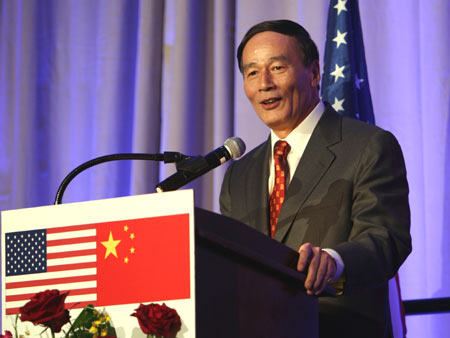As predicted last week: the new Politburo Standing Committee of the Chinese Communist Party is as follows: ![]()
- Xi Jinping (习近平), who is expected to become the president of the People’s Republic of China, the general secretary of the Party and ‘paramount leader’, and a ‘princeling’ whose father was a Party dignitary;
- Li Keqiang (李克强), who is expected to become premier;
- Zhang Dejiang (张德江), a longtime hand who has served as Party secretary in Guangdong province and most recently, replaced disgraced Party figure Bo Xilai as Party secretary in Chongqing municipality — and also a ‘princeling’;
- Yu Zhengsheng (俞正声), Party secretary in Shanghai municipality and a princeling as well;
- Liu Yunshan (刘云山), director of the Party’s propaganda department (i.e., in charge of censorship and Internet restriction as well);
- Wang Qishan (王岐山), a vice premier for economic, energy and financial affairs, and expected to play a major, reformist role in economic policy in Xi’s government; and
- Zhang Gaoli (张高丽), currently the Party secretary of Tianjin municipality, and a former official in Shenzhen’s special economic zone.
The Politburo Standing Committee has been reduced from nine members to just seven. Interestingly, the five new members (Xi and Li were already members) are relatively old — and so old that they will not be eligible for re-appointment in 2017 at the next National Congress because each will be older than the 67-year age limit for members of the committee.
Both Zhang Gaoli and Zhang Dejiang, as well as Yu Zhengsheng are firmly protégés of former president Jiang Zemin (江泽民), who preceded current president Hu Jintao (胡锦涛), who is stepping down to make way for Xi.
Left out are two key Hu allies: Li Yuanchao, currently director of the Party’s organization department, and Wang Yang, Party secretary in Guangdong province and perhaps the most notable advocate for political reform.
Liu Yandong, the only woman serving on the Politburo, also failed to make the cut.
As has been predicted in recent days, Xi will become the general secretary of the Party and will also immediately assume the chairmanship of the CPC Central Military Commission.
Xi is currently speaking to the press now, and his speaking style surely seems much more relaxed and expressive than Hu’s.






